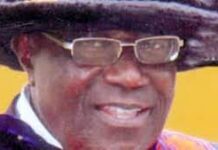By Our Reporter

A judge of the Lagos High Court sitting at Ikeja, Justice O. A. Oresanya, has drawn criticisms from lawyers who allege that he approves a court process that is allegedly unethical in legal practice.
This happened in the course of an appeal case before Justice Oresanya. In the case heard on 31st January 2023 at the Lagos High Court which was between former Mrs Rihole Odulate and her ex-husband, Mr Rotimi Koyejo Odulate, the owner of the popular ALABUKUN pain killer drug made in Lagos, Ms Rihole filed an appeal against Mr Odulate. In the suit, the appellant accused Odulate of refusing to make financial payments for the upkeep of their two children following a divorce case previously determined in a UK court.
Ms Rihole is represented in the suit by Ukiri Lijadu Chambers while Mr Odulate is represented by the firm of Wigwe & Partners. According to our findings, the suit came up on 31st January 2023 before Honourable Justice Oresanya of the High Court of Lagos State for the hearing of an application for injunction pending appeal. Ukiri Lijadu Chambers lodged the Appeal against the Ruling of the above Court setting aside on 22nd December 2022, the registration of the English Cost Orders made at the financial remedies proceedings. This led to filing an application for injunction pending appeal to preserve the restriction on the Respondent’s account with First Bank Plc.
At the proceeding on 31st January 2023, our reporter gathered that the appellant’s lawyers were in attendance, but there was no legal representation for the respondent. Lawyers for the appellant informed the Court that their application was not responded to by the Respondent, and they argued that as a result the application which was fixed for 31st January 2023 was ripe for hearing unopposed.
The Judge however informed the appellant’s lawyers that the Respondent’s lawyers wrote a letter to the Court seeking an adjournment of the suit. According to our investigation, lawyers for the appellants submitted to the court that having not sent them a similar letter and having not filed same as required by the Rules of Procedure set out in judicial precedents, they opposed the application for adjournment and urged the Court to discountenance it.
In spite of the submission made by the appellant’s lawyers, the judge said he was adjourning the hearing of the case with a cost to the Respondent. This pronouncement by the judge met with the displeasure of the lawyers for the appellant who immediately expressed their reservations to the judge. They also proceeded to file court papers to register their grievances regarding the action that the judge took.
However, a senior lawyer who speaks on the condition of anonymity is of the opinion that it is standard practice that lawyers to one party serve any letter in a suit on the other party notifying the court of their absence, but this can be obviated by the fact that the letter has followed normal filing procedures to get to the judge. If the letter is properly filed in the court, the judge has to consider it.”
According to the senior lawyer, “It’s required that lawyers let such a letter stating the reasons for their absence be served on the lawyers for the other party, as well as the court. If such letter is properly served on a court however, a judge could take it into consideration irrespective of whether or not the same letter has previously been served on the lawyers to the other party.”
The senior lawyer states further that, “the content of the letter may even sway a judge to take the decision to entertain the request of the lawyers who are absent from court. This is especially the case when the lawyer involved is ill. Although we do not know if illness is the reason proffered in this particular case, but once ill health is involved a judge takes it serious because we lawyers take the good health of any legal practitioner seriously.
“Overall, a judge can grant the request for adjournment sought by a lawyer who is absent from court if the reasons proffered are judged to be reasonable enough, and not seen to be an effort to frustrate progress being made in a case.”












